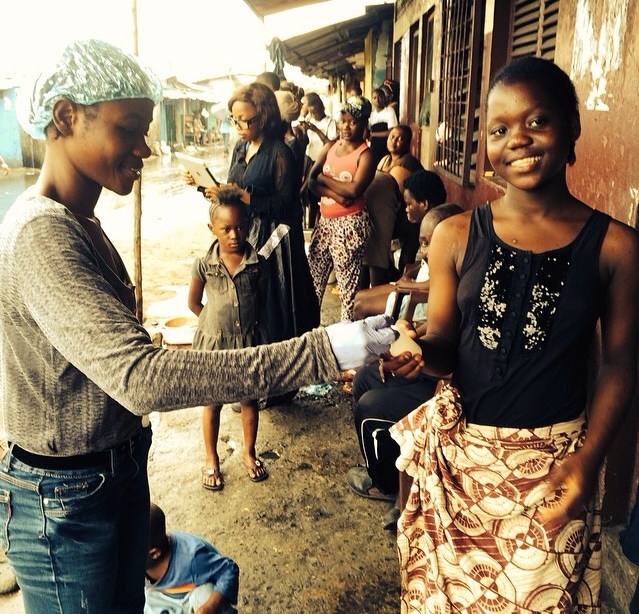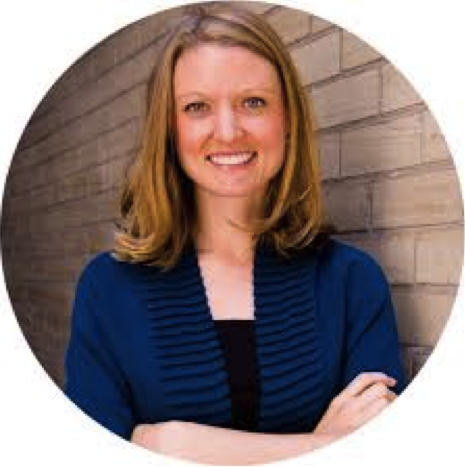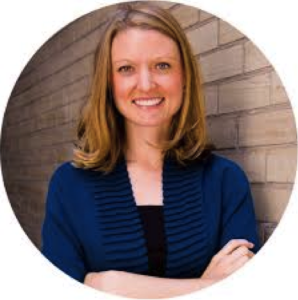A guest post by Alison Carlman
Archie Gbessay, 28, is a fierce protector of his siblings, and a passionate young leader in a Liberian slum called West Point. After his mother died of cancer, Archie had a dream to become a surgeon. He works hard to save $20 each month so he can start a small business selling electronics. Archie hopes the business will earn him enough money to go to medical school some day. But when Ebola came to Liberia, Archie took the lead of a community task force to head off the disease. Archie’s dream to become a surgeon is now on hold; today he’s driving the Ebola-Free West Point Coalition, and he’s fighting to keep his community alive.
Equipped with information, a megaphone, buckets, chlorine, and community trust built over his lifetime, Archie is a one of the most crucial weapons against Ebola in Liberia.
Foreign agencies and our military are bringing beds and protective suits to treat the sick, but Archie has the skills to prevent his neighbors from contracting Ebola in the first place.

There seems to be a narrative coming from the aid community that Americans don’t care about Ebola in West Africa, but I believe there is a solid core of generous people who would’ve been moved to act sooner if we, at aid agencies and non-governmental organizations (NGOs), had told stories coming from locally-driven prevention and treatment efforts more urgently, realistically and effectively. As this blog points out, stories about the local response to Ebola are hard to find.
The biggest of all international disaster responders, the American Red Cross, held held off on mobilizing individual donors to respond to Ebola partly due to a lack of (donor) interest, according to an ABC story. They waited until this month to create an Ebola-specific donation campaign. This delay (or choice not to engage individual donors) certainly influenced other major funders and responders who are hanging on the sidelines waiting for their influential peers to act first. The result? As one NY Times story explains, Americans aren’t giving because they haven’t been asked.
I work for GlobalGiving, the first global crowdfunding marketplace, and we’ve matched more than 400,000 donors with more than 10,000 grassroots projects in the developing world over the last decade. I’ve read enough emails from GlobalGiving donors over the last few months to know that individuals from outside Africa do care. What we as aid agencies and non-governmental organizations need to do is a better job of demonstrating how one person’s donation can make a difference for individual people fighting Ebola in their own neighborhoods.
This health crisis has turned into a humanitarian crisis that will have devastating long-term psychological, social, and economic effects. In “Hotel Rwanda,” Joaquin Phoenix’s character predicts that when the public is confronted by footage of the 1994 Rwandan genocide, “they’ll say ‘Oh my God, that’s horrible,’ and then go on eating their dinners.”
Two decades later, we can’t stand by with the same sense of helplessness in the wake of this ongoing tragedy. It’s 2014 and this time, Americans have the means, the technology, and the will to engage with and support people like Archie who will stop the Ebola outbreak.
By all means, yes, we should continue to implore international leaders to invest right now in immediate efforts to stop the epidemic and long-term work to develop better health infrastructure in West Africa. But you better believe that after the U.N. and the U.S. have packed up their tents, Archie and community-based leaders and organizations will be the ones driving the long-term recovery for a generation ravaged by Ebola.
So please don’t believe it when you hear that Americans don’t care about Ebola. All of us—everyday citizens as well as NGO communicators—need to change that self-fulfilling narrative. Help your friends and family feel empowered by knowing that there are safe, efficient, and reliable ways to make meaningful contributions by supporting vital local community leaders like Archie and the Ebola-Free West Point Coalition. In doing so you’ll let those courageous women and men know that that we are with them.
Alison Carlman is Senior Manager of Communications and Marketing at GlobalGiving.
***
Related Posts
The stories still hard to find: The local responses to Ebola
What happens when the crisis dries up?
Do grassroots organizations in poor countries have an image problem?
“Create” nothing, a new social good mantra
Don’t change the message. Change the messenger.



For an analysis of Ebola relief funding compared to other major global disasters of recent years, see: http://www.grantcraft.org/blog/trends-in-ebola-relief-funding
“The American Red Cross, who raised almost $500 million for Haiti and more than $85 million for the Philippines, has so far received less than $3 million for Ebola – $2.8 million of which came from the Paul G. Allen Family Foundation.”
Very inspiring and thought provoking article.
Pingback: West Africans are not powerless against Ebola…and neither are we — GlobalGiving Blog – News and Updates